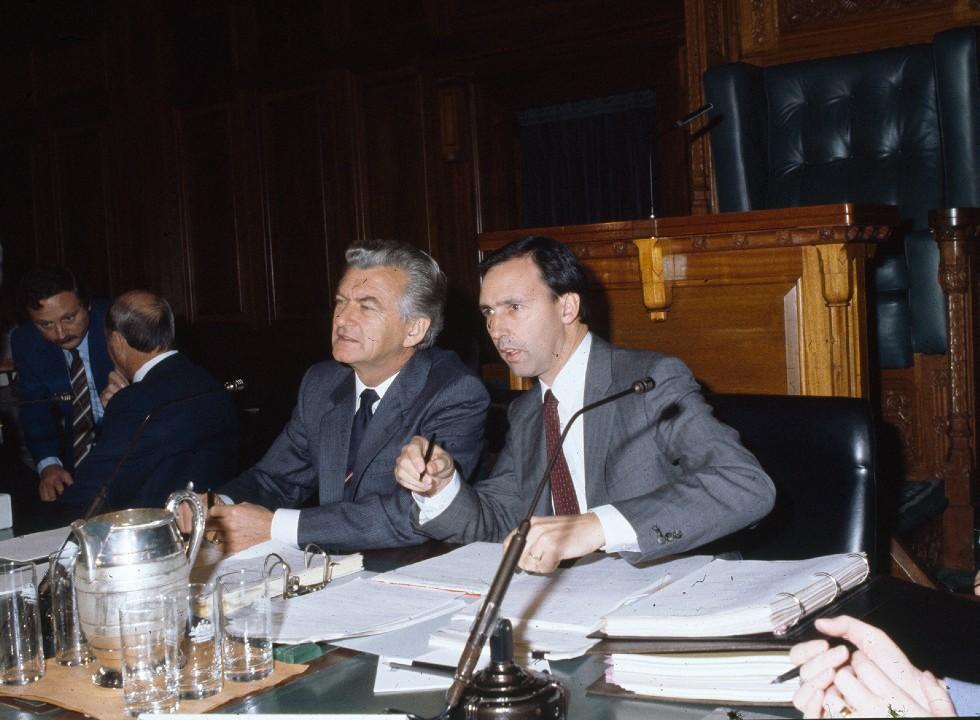Economic reform is way overdue in this country.
In 1985 when Paul Keating opened up Australia to foreign capital markets he sold our children out.
Instead of financing government expenditures from domestic earnings and income from infrastructure, he allowed foreign banks via our domestic banks to inflate our house prices sending hardworking Australians into prosperity destroying wealth.
As a result two parents had to go back to work, causing our children to slide in education rankings.
Our infrastructure has also had to be sold to pay for this debt. Thanks to stupid politicians we are leaving the cupboard bare for our children.
Chamber: Senate on 8/11/2023
STATEMENTS BY SENATORS – Economy
Senator RENNICK (Queensland) (12:55): Australia faces a leadership crisis. We have a crisis amongst our leadership with their intellect and with their integrity and—most notably in regard to their integrity—with their lack of intellect as to what we are going to do moving forward to solve the cost-of-living crisis. Just yesterday, we saw the RBA raise interest rates yet again, for the umpteenth time in the last two years, and somehow that’s expected to solve the economy? Well, that is not going to happen. We need to have a serious review of the way this country is run. While I won’t pretend to be able to stop the transmission of airborne viruses or change the climate, I can use my financial controlling skills to review the way that government operates in this country.
One of the things we have to do in this country is actually have a serious federation convention to look at the excess bureaucracies in this country. Time after time, I go into estimates and I get stonewalled by bureaucrats with smug grins on their faces, taking questions on notice, refusing to answer questions and complaining about answering questions. That is an utter disgrace to the hardworking Australians whose taxes pay these bureaucrats. We need to look at reforming our federation to streamline the roles and responsibilities of both state and federal governments, to look at the vertical fiscal imbalance and the duplication of services given to the Australian people, because the Australian taxpayer’s dollars matter. Let me tell you the brown paper bags of yesterday are today’s green tape, red tape, black tape, blue tape—you name it, there’s a bureaucrat out there somewhere rorting the system with unnecessary rules and procedures that are destroying the entrepreneurship and the aspiration that Australian people so badly need and deserve.
This federation convention that we have should be broken into constitutional changes and non-constitutional changes. Clearly, the non-constitutional changes would be much easier to make. I’ll give you one example we could look at: the way federal highways are funded. Currently, the federal government funds 80 per cent of the federal highways and the state government funds 20 per cent of the highways. Then the state government goes on and pays, generally, a foreign contractor to build those roads. You have to seriously ask why we have foreign contractors building these roads and why we couldn’t get the federal government to fund these roads 100 per cent and then have a civil engineering corps in the Army. That wouldn’t require a change in the Constitution. All it would require is a bit of common sense and willpower between state and federal governments.
The next thing we need to look at is our taxation system. Our taxation system is inherently flawed to give concessions to the wealthy and to foreign interests. We need to look at closing the loopholes with universities under section 51 of the Income Tax Assessment Act 1997. We need to look at ensuring everyone pays their tax. Section 855 of the 1997 act says that if you’re a foreigner and you make a capital gain on non-real assets—that includes the sale of water rights—you don’t pay capital gains tax. We have to look at Aboriginal land trusts and see why they don’t have to pay tax on native title royalties and mining royalties. We have to look at section 128F of the Income Tax Assessment Act 1936. It’s called the public offer test. It effectively allows foreign banks to earn interest here in Australia and pay no tax on it.
Most of all, we have to look at our withholding tax system in this country, which has a higher tax rate for onshore earnings than it does for offshore earnings. I’ll give you one example of how this works. I’ve got here the Securities and Exchange Commission report from Pfizer on 30 June 2022. On 30 June 2022, Pfizer had a revenue of $100 billion for that 12 months. They made $34 billion profit before tax. They had a profit ratio of 34 per cent.
But if you have a look at the Australian Pfizer financial accounts, they made revenue of $1.3 billion but only made $94 million in profit. That is, their operating profit ratio was only seven per cent. You have to ask yourself, why did Pfizer only have an operating profit ratio of seven per cent here in Australia when their worldwide operating profit ratio was 34 per cent? I will tell you why: it’s because the rate of tax in Australia, at 30c, is more than twice the rate of tax on interest royalties and rent paid offshore. We can see what Pfizer has done, because there’s a trick to the way you read these accounts: you go into related-party payments. If we go to the back of the account we can see an outstanding figure to Pfizer Service Company Ireland of $1.1 billion. Why would they actually pay Ireland $1.1 billion for services? It’s because Ireland only has a company tax rate of 10c.
It’s very easy: we have to restructure the way we tax earnings in this country, because our current tax system encourages earnings derived here in Australia to go offshore and then we turn around and give a tax break to banks to lend money onshore. If anyone understands what a balance sheet looks like, that means we encourage foreign debt and push domestic equity offshore. Let me tell you something: debt is slavery and equity is freedom. If we want to make sure our children grow up in a prosperous country, like we grew up in and that our forefathers built for us, then we have to reform our tax system.
The last thing which we need to look at, most of all, is the least understood of all these measures: our monetary policy. Basically, there are three levers to control monetary policy: qualitative and quantitative easing and macroprudential. I’ll touch on macroprudential first. In 1985, Paul Keating lifted the capital controls in this country. According to the Parliamentary Budget Office, that meant that in 1995 the Australian government had $8 million in debt, and by 2008 they had $36 billion in debt. But, here’s the thing: the banks had $6 billion in debt in 1985 and by 2008 they had $800 billion in foreign debt. Is that the right thing to do? No, it isn’t. Our one and only banking royal commission in 1937—note, I’m referring to the only banking royal commission. There was another one in 2016 that dealt with corruption in the banking, financial and superannuation industries, but the actual real banking commission, which set Australia up for prosperity through the 1960s and 1970s, said: ‘The most desirable banking system in the present circumstances of Australia is one which includes privately owned trading banks. The system contemplated is one in which a strong central bank regulates the volume of credit’—the volume of credit—’and the distribution of credit is left to privately owned trading banks.’
What does the ‘volume of credit’ mean? It means that there is debt and equity on a balance sheet. What Paul Keating did in 1985 was to remove all the macroprudential controls, lift all the capital controls and just let the banks rip. They went out and borrowed $800 billion instead of the government enforcing that corporations and banks use domestic savings. If we actually want to increase supply instead of destroying demand, which is what the RBA is doing, we need to issue credit—we need to issue new capital. There are two ways to issue capital: either issue bonds or issue shares. For some strange reason, governments only ever issue bonds and yet governments—sovereign governments, at least—have title over all the land. The question is: why don’t they issue new shares against sovereign infrastructure? Okay?
That sovereign infrastructure, of course, is power stations, dams, roads, rail, ports, airports and telecommunications. Corporations issue new shares all the time; a mining company might want to open up a new mine and it will issue a new share. So how do we go about implementing this idea? We issue one share in a bank called the infrastructure bank, and that share will be owned by our children and called ‘untapped wealth’. That infrastructure bank can then lend to federal or state governments. Say, for example, a state government wants to build a dam for a billion dollars. If the infrastructure bank that’s owned by the Australian people makes a loan to the state government for a hundred years at one per cent, that means that the first billion dollars in wealth that the state government makes would be repaid to the federal government. The key point here is that that first billion dollars in wealth stays within Australia. Right now, we go and tap the world’s biggest market, of course, which is the US Treasury bond market. The US Treasury bond market is money that is printed by the Federal Reserve privately owned banks in the States. It’s not actually US dollars it’s printing; it’s the privately owned bank dollars it’s printing. Every time we create new infrastructure assets here, when we repay that debt, we let all that wealth go offshore.





























